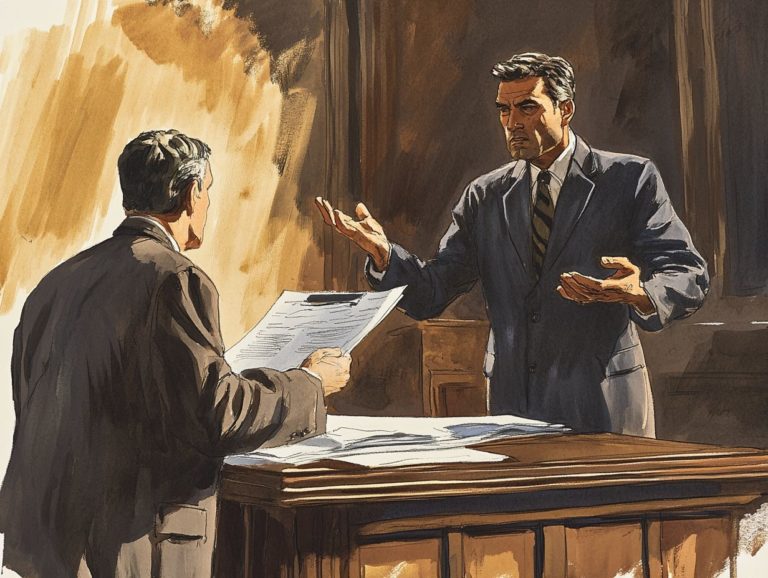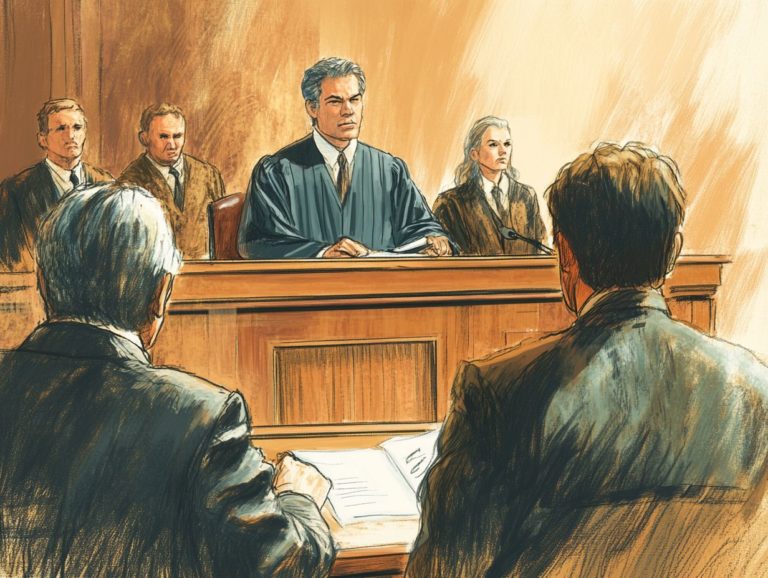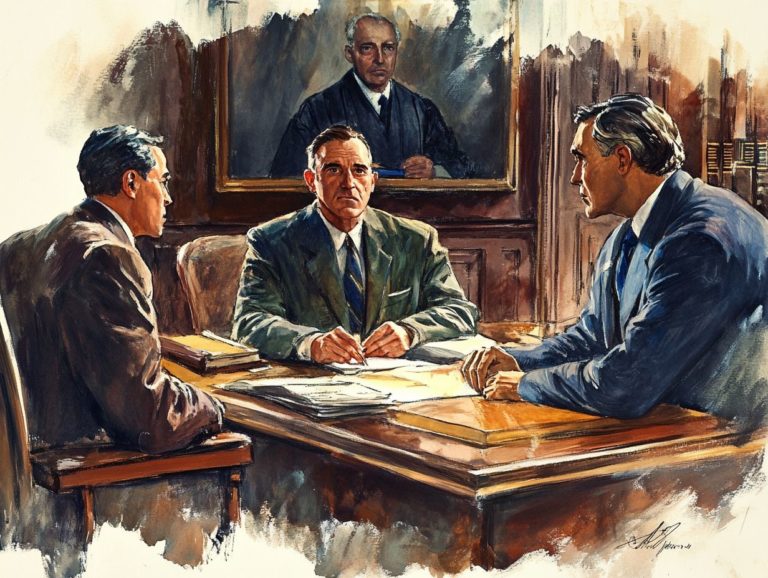The Role of Defense Counsel in Plea Deals
Plea deals play a pivotal role in the criminal justice system. They shape the outcomes of cases long before they ever reach trial. Understanding what plea deals are and their purpose is essential for grasping their intricate workings.
The role of defense counsel is crucial in negotiating these agreements. They advocate for defendants and navigate the complexities inherent in the process. Several factors come into play when it comes to plea deals, including the strength of the evidence and the defendant’s prior criminal history.
Defense attorneys encounter unique challenges. They face ethical dilemmas and pressure to achieve favorable outcomes for their clients. This article dives into these dynamics and explores alternatives to plea deals. Learn how you can navigate this crucial part of the legal system!
Contents
- Key Takeaways:
- Understanding Plea Deals
- The Role of Defense Counsel
- Factors that Influence Plea Deals
- Challenges Faced by Defense Counsel
- Alternatives to Plea Deals
- Frequently Asked Questions
- What is the role of defense counsel in plea deals?
- How does the defense counsel negotiate a plea deal?
- Can the defense counsel force a defendant to accept a plea deal?
- What factors does the defense counsel consider when negotiating a plea deal?
- Do all criminal cases involve plea deals?
- Can a defendant change their mind after accepting a plea deal?
Key Takeaways:
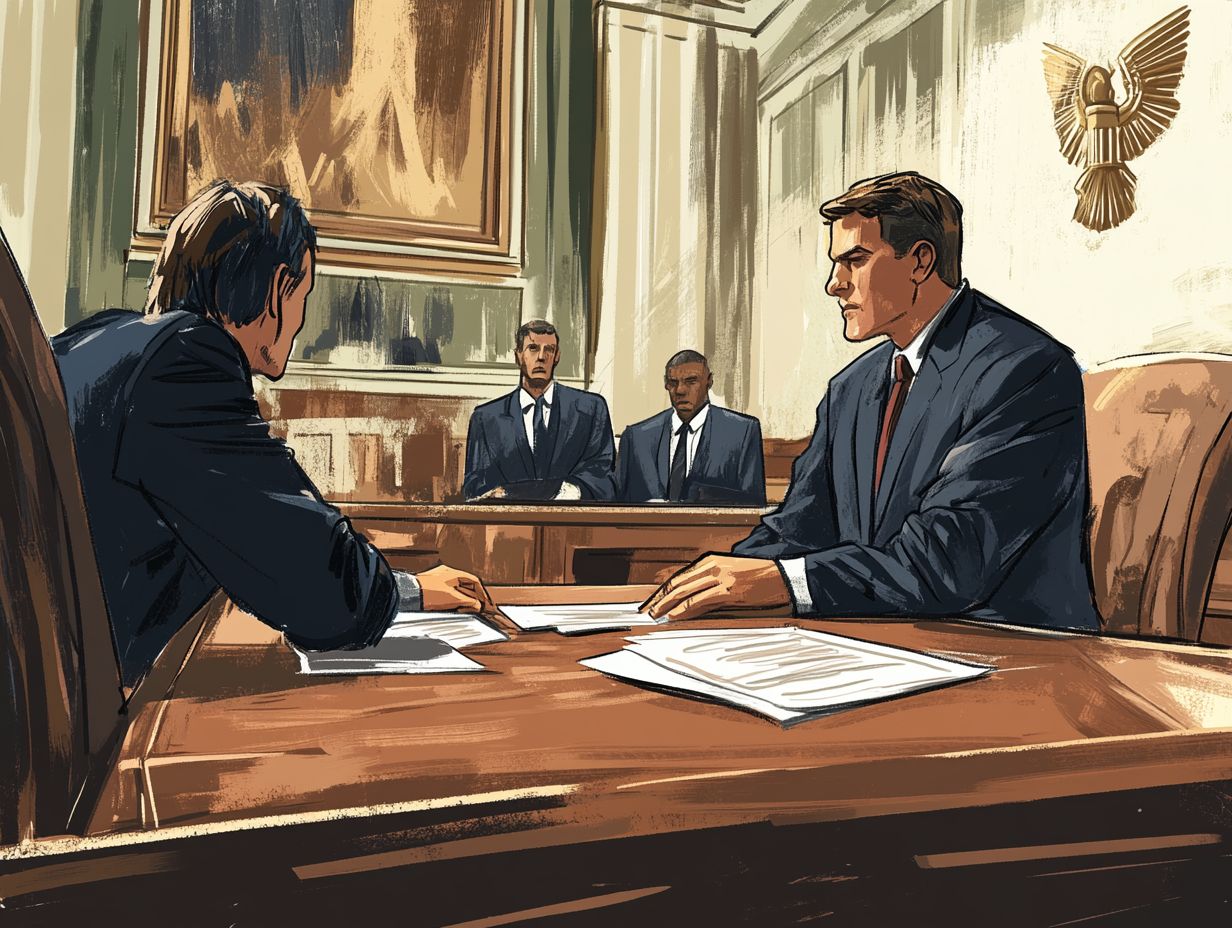
Your defense counsel is your strongest ally in plea negotiations.
Factors such as the strength of evidence and the defendant’s criminal history can heavily influence the outcome of a plea deal.
Defense counsel may face ethical considerations and pressure to secure a deal. However, alternatives such as going to trial or participating in diversion programs can also be explored.
Understanding Plea Deals
Understanding plea deals is crucial in criminal law. They function as a negotiation strategy between the defense attorney and the prosecution.
This arrangement allows defendants to plead guilty to a lesser charge. In exchange, they may receive a potentially reduced sentence. Such arrangements strive for efficient case resolution and consider the legal consequences and ethical implications inherent in the plea agreement process.
Definition and Purpose
Plea bargaining is an agreement where you, as a defendant, plead guilty to a lesser charge. This arrangement serves several important functions within the legal system, notably streamlining court proceedings and easing the considerable caseload that judges and attorneys face.
By choosing to enter into plea bargains, you can sidestep the unpredictability of a trial. Outcomes can hinge on jury perceptions or the strengths of legal arguments. It s crucial to understand that these negotiations ensure you are fully informed about your rights and the potential repercussions of waiving them, enabling you to make educated choices.
This process also reduces uncertainty for everyone involved. It promotes the efficient use of judicial resources, ultimately benefiting the legal system as a whole.
The Role of Defense Counsel
The role of a defense attorney in plea bargaining is pivotal. They expertly employ negotiation strategies to secure the most favorable outcome for you while upholding ethical obligations.
Your interests are always at the forefront of their efforts. This ensures that you navigate the legal landscape with the best possible guidance.
Negotiating and Advocating for the Defendant
Negotiating and advocating for the defendant requires harnessing legal expertise and negotiation skills. These are essential for securing a favorable outcome in plea deals. Your grasp of the case’s strengths and weaknesses is vital.
In this intricate dance, you ll employ a range of negotiation techniques. These can include building rapport with prosecutors and crafting compelling arguments that highlight mitigating factors.
As an effective advocate, you understand the significance of your role. You re not just representing your client; you re actively fighting for justice and ensuring they receive fair treatment within the legal system.
To arrive at the best plea offer, you meticulously analyze every facet of the case. This involves weighing evidence, potential sentencing, and your client s unique circumstances.
This thorough evaluation enables you to navigate complex discussions with finesse. You strive for outcomes that truly serve your client s best interests.
Factors that Influence Plea Deals
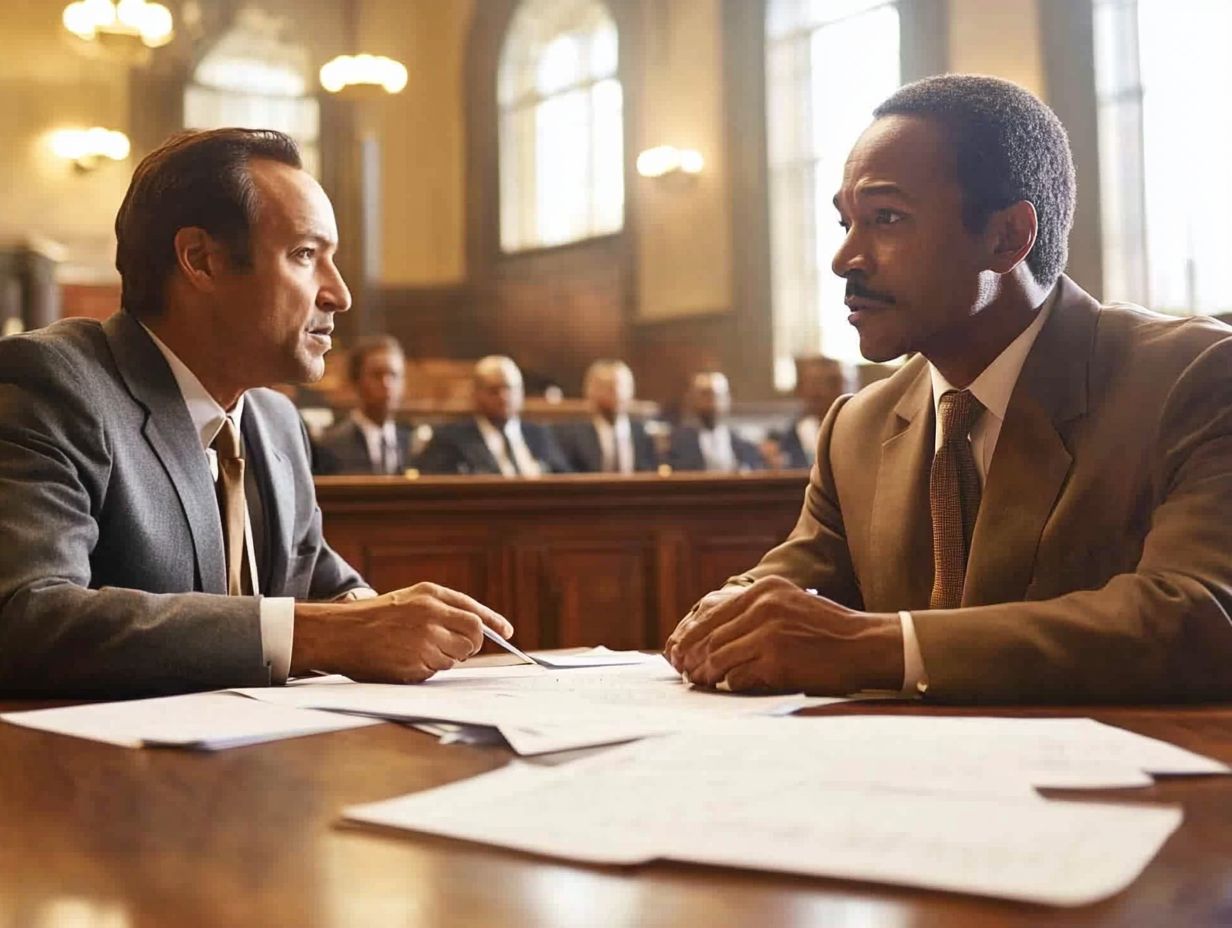
Several factors influence plea deals. The strength of the evidence can significantly sway the outcome.
Mitigating factors presented by the defense can also influence decisions. Your criminal history can dramatically shape your plea deal.
Judicial discretion adds complexity to how plea deals are shaped.
Strength of Evidence
The strength of the evidence against you greatly influences plea negotiations. This shapes the prosecution’s case and your legal consequences.
When the evidence is compelling, your defense attorney will guide you on whether to accept a plea deal or risk going to trial. This decision involves evaluating both the quantity and quality of the evidence.
Your attorney will analyze witness reliability, forensic findings, and adherence to procedures. This helps gauge the likelihood of a favorable outcome.
A comprehensive understanding of the evidence enables effective negotiation strategies, ensuring you are well-informed about your choices.
Defendant’s Criminal History
Your criminal history plays a significant role in plea bargaining. Previous charges can lead to additional penalties during negotiations.
You must analyze your past to develop a strong defense strategy that considers the nuances of prior offenses. A troubled history may provoke harsher terms from the prosecution.
Your legal representatives will craft persuasive arguments highlighting your rehabilitation or mitigating circumstances. They balance transparency and advocacy to lessen the impact of your previous charges while pursuing the best plea offer.
Understanding how your history affects negotiations can greatly influence the outcome of these discussions.
Challenges Faced by Defense Counsel
As defense counsel, you face various challenges during plea negotiations. You must navigate the ethical implications while managing the pressure to secure a deal that aligns with your client’s best interests.
Balancing these demands while upholding professional ethics is crucial.
Ethical Considerations
Ethical considerations in plea bargaining are essential. You must balance your client’s interests with your ethical obligations and maintain the integrity of legal representation.
This requires advocating for the best possible outcome while providing clear guidance throughout the decision-making process.
You must ensure that your clients understand the ramifications of accepting a plea deal. This choice can significantly impact their future.
Your role extends beyond representation; you are a vital partner in a complex legal journey.
Pressure to Secure a Deal
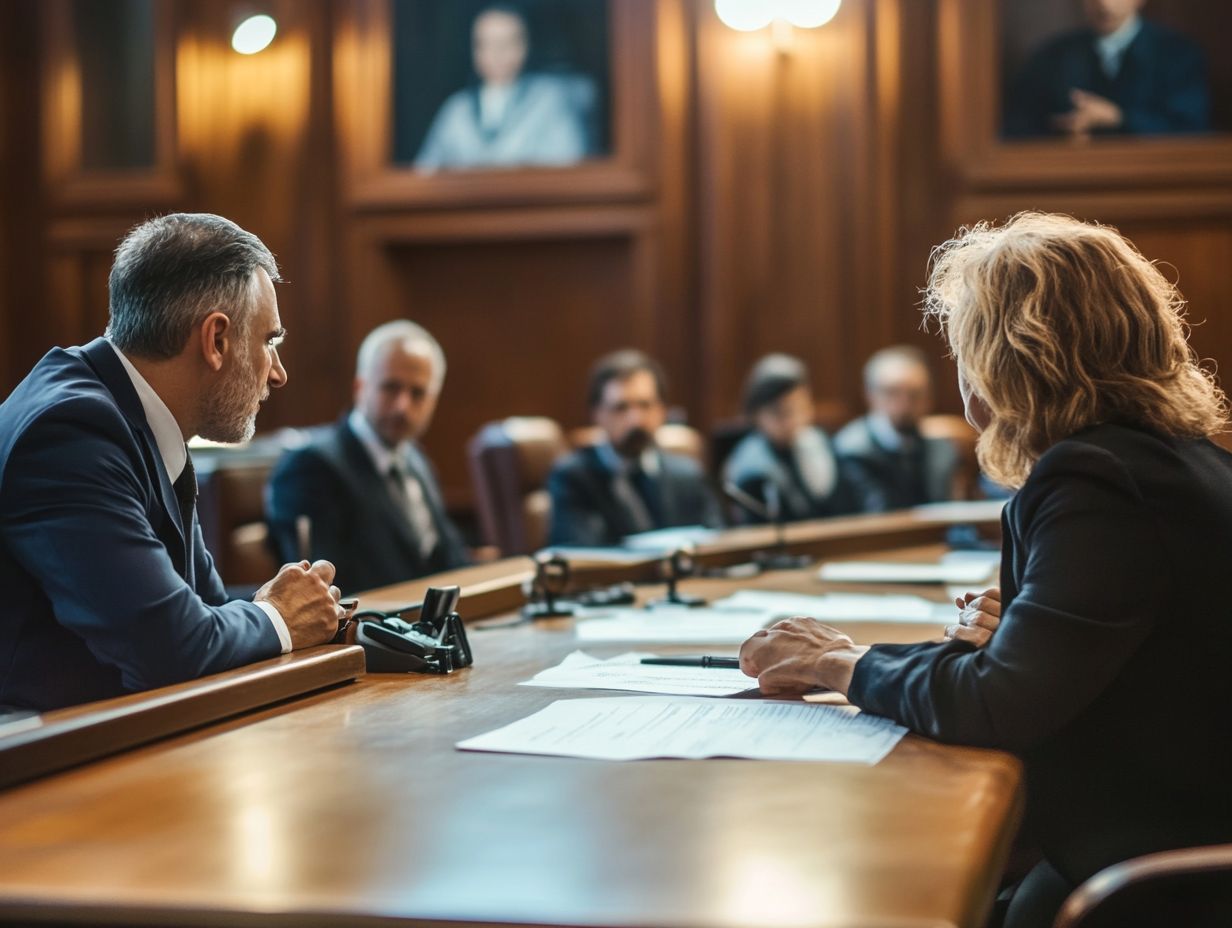
The pressure to secure a plea deal can pose significant challenges for defense lawyers. This pressure often leads to hasty decisions that overlook critical aspects of risk assessment.
External pressures can arise from various sources, including tight deadlines and the expectations of clients and their families. Many public defenders also face overwhelming caseloads.
This can reduce the quality of legal representation. Consequently, the attorney-client relationship may erode, compromising trust and open communication.
Clients may feel rushed into accepting plea offers without fully grasping the potential ramifications for their futures. This urgency underscores the need for thorough case evaluations, ensuring defense strategies are tailored to the unique circumstances at hand. Ultimately, this approach safeguards clients’ best interests.
Alternatives to Plea Deals
Exploring alternatives to plea deals, such as opting for a trial, considering deferred prosecution, or engaging in diversion programs, can lead to more favorable outcomes.
These options may provide strategic advantages, allowing for tailored approaches to individual circumstances and potentially yielding better results.
The Risks of Going to Trial
Choosing to go to trial exposes defendants to significant legal ramifications. There is uncertainty regarding a jury’s decision and the possibility of harsher penalties compared to accepting a plea deal.
This decision is crucial; it involves a delicate balance of legal strategies and human emotions. The jury, usually comprised of individuals from diverse backgrounds, determines the fate of the case. This unpredictability heightens stress for everyone involved.
As you approach this critical juncture, your defense attorney must prepare you thoroughly. You should grasp each step of the trial process and the implications of your choices. Effective communication is essential in fostering a collaborative relationship that can significantly influence the defense strategy.
Deferred Prosecution or Diversion Programs
Deferred prosecution and diversion programs offer helpful programs within a legal framework that can lead to case dismissal upon successful completion.
These options allow you to address underlying issues, such as substance abuse or mental health challenges. They typically come with specific eligibility criteria, focusing on non-violent offenses.
By engaging in these programs, you can avoid the collateral consequences of a criminal record, such as difficulties in securing employment or housing.
The role of your defense attorney is vital. They guide you through the complexities of these alternatives, ensuring you understand your rights and the benefits of rehabilitation over traditional plea deals.
Ultimately, these programs can pave the way for a brighter future while easing the strain on the court system.
Frequently Asked Questions
What is the role of defense counsel in plea deals?
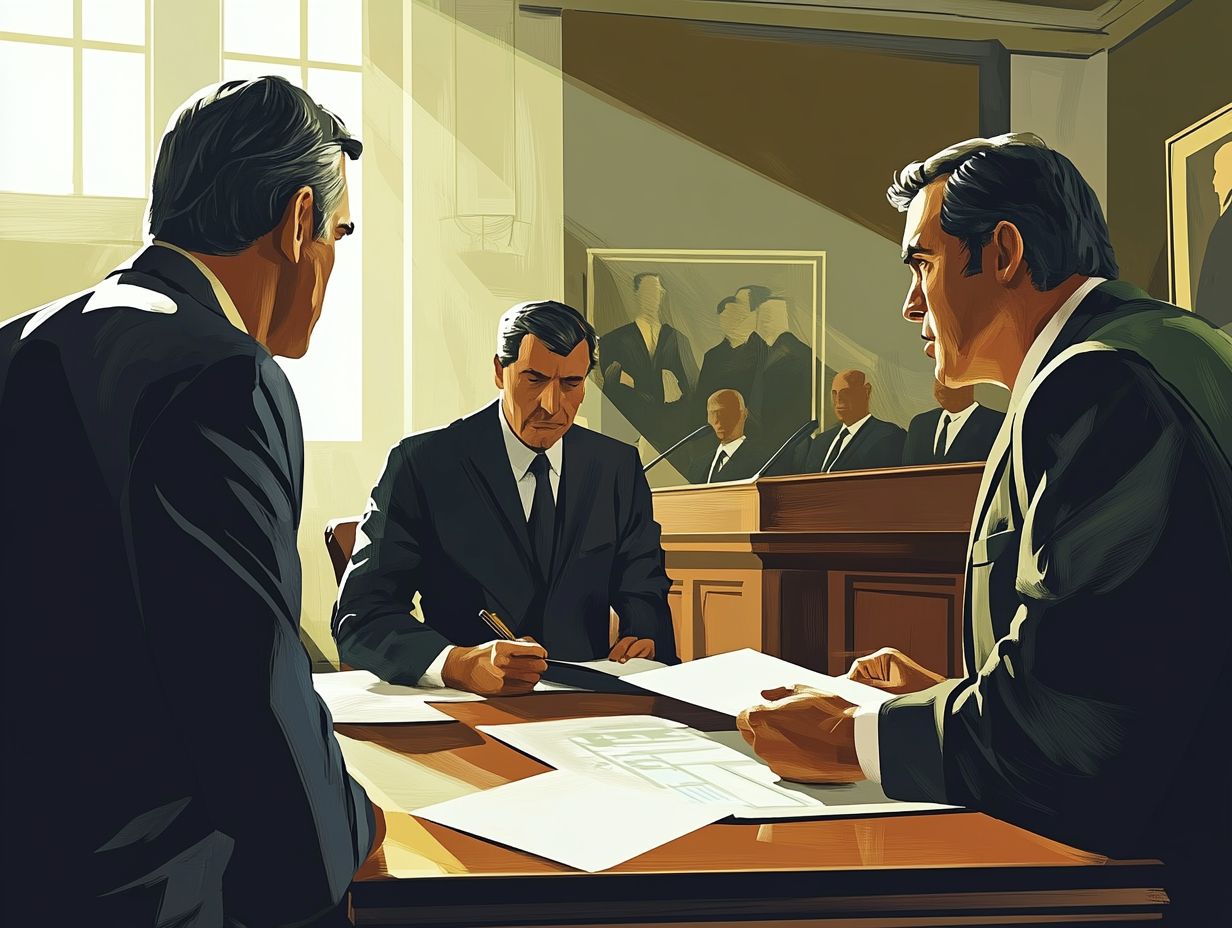
The role of defense counsel in plea deals is to represent the defendant and negotiate with the prosecutor. They advise the defendant on their legal rights and options, working to secure the best possible outcome.
How does the defense counsel negotiate a plea deal?
The defense counsel reviews the evidence and charges against the defendant. They discuss potential plea options with the prosecutor and gather mitigating evidence to strengthen their bargaining position.
Can the defense counsel force a defendant to accept a plea deal?
No, the defense counsel cannot force a defendant to accept a plea deal. It is ultimately the defendant’s decision to accept or reject a plea deal, and the counsel’s role is to advise and advocate for the client’s best interests.
For personalized advice, consult with your defense attorney to explore the best options for your situation.
What factors does the defense counsel consider when negotiating a plea deal?
The defense counsel looks at the strength of the evidence against the defendant. They also consider any factors that could lessen the severity of the situation, the possible consequences of going to trial, and the defendant’s personal goals.
Do all criminal cases involve plea deals?
No, not all criminal cases involve plea deals. Some may go to trial if the defendant chooses not to accept one or if the prosecutor doesn’t offer a suitable option. Plea deals are common and can be beneficial in many criminal cases.
Can a defendant change their mind after accepting a plea deal?
In most cases, a defendant cannot change their mind after accepting a plea deal. Once it s accepted and recorded, it s legally binding. There may be exceptions if new evidence comes to light that could affect the case outcome.


